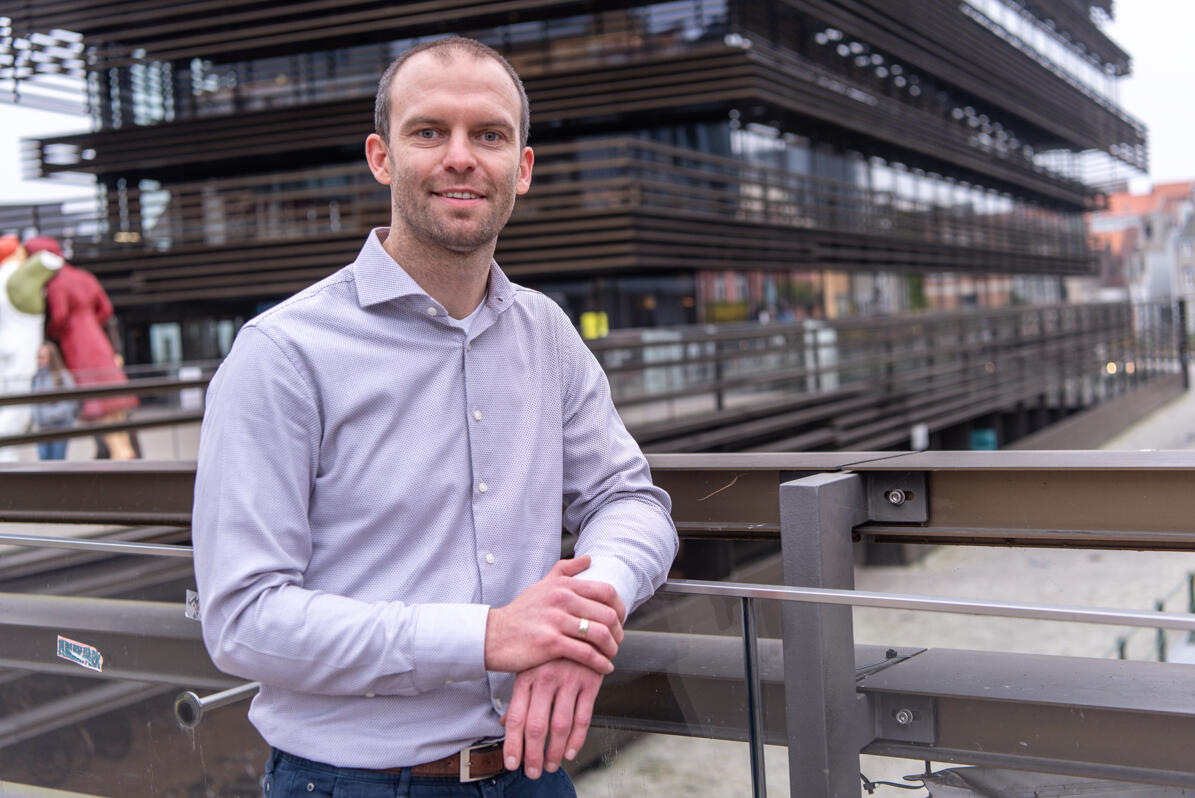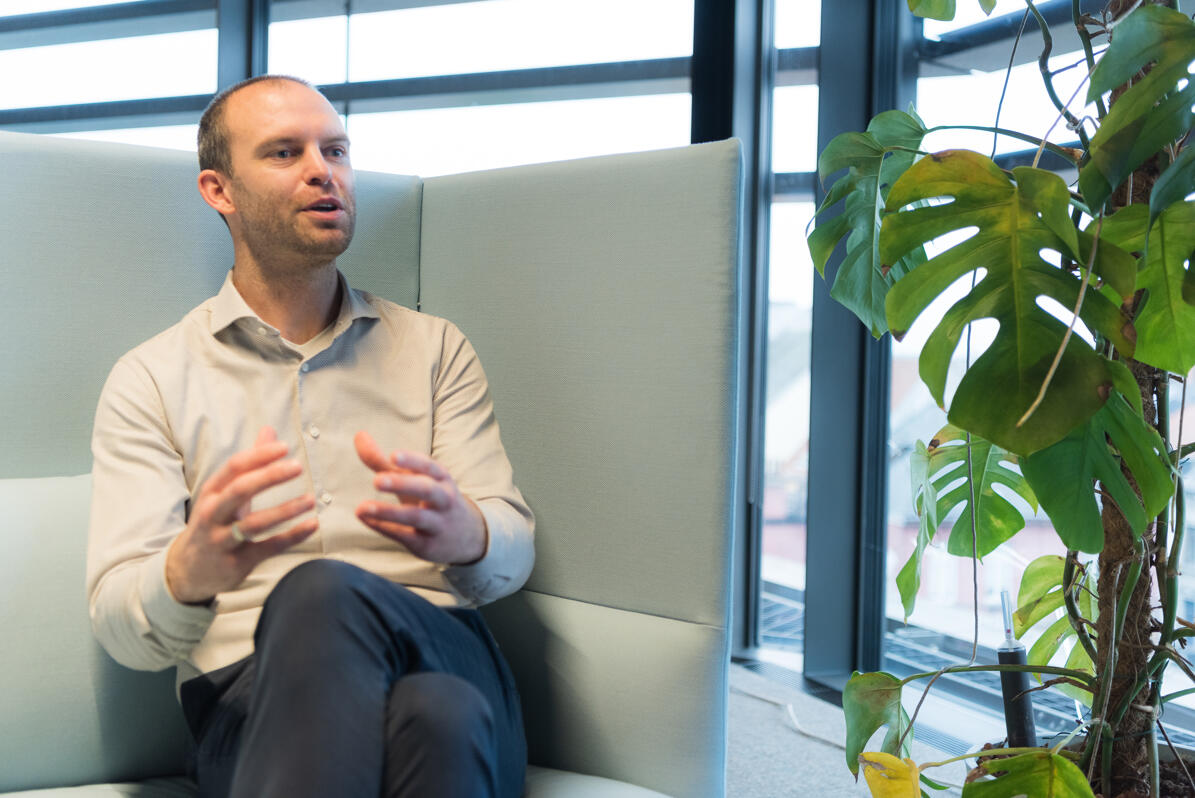Imec.istart promotes innovation and entrepreneurship
Thanks to imec.istart, the Ghent accelerator for tech start-ups, numerous companies are realising their dream of international growth.
Thanks to the support and guidance of imec.istart, the Ghent-based accelerator for technology start-ups, many companies are achieving the international growth they’re dreaming of. The comprehensive approach of imec.istart’s acceleration programme offers budding tech entrepreneurs the opportunity to accelerate their growth. On the occasion of their 10-year anniversary, the City of Ghent spoke to programme director Sven De Cleyn.
What was the driving force behind imec.istart?
Imec.istart was launched in 2011, several years after the dot-com bubble. At that time, the Flemish IT industry looked completely different to how it does today. The then CEO of IBBT, the Interdisciplinary Institute for BroadBand Technology (later iMinds), asked the CEOs of large Flemish companies why they were still in Flanders. The main motivation turned out to be the goal to lower the total cost of new developments each year in order to remain competitive with other countries. IBBT realised this model wasn’t feasible for keeping a lot of the IT industry here. People woke up and saw the need to feed the ecosystem with new companies from the bottom up. So, 10 years ago, the idea came about to develop a programme to support young, new technology companies in the IT industry. Whether they collaborated with the R&D department of the organisation or not.
Imec.istart ensures that new, young technology companies make a faster transition from the first prototype of a product to a successful company.
What does imec.istart’s mission entail exactly? And how do you approach this in concrete terms?
Imec.istart ensures that new, young technology companies make a faster transition from the first prototype of a product to a successful company. A business whose foundations are stable enough for it to grow into a strong and flourishing company. To achieve this, we offer a substantial coaching and support programme of at least twelve months. During this journey, we combine a minimum funding of 50,000 euros per company with workshops, mentorship, 1-on-1 coaching, housing support, and so on.
Imec.istart is part of the internationally renowned research institute imec. What advantages does this give the tech start-ups you support?
Imec is a technology hub with around 4,000 in-house technology experts in all kinds of areas. Our involvement in imec means a lot to our start-ups. We offer them easy access to this know-how so that they can, for example, hold sparring sessions with the specialists at imec. We also make it easier to actually start a research collaboration with imec. Additionally, as a renowned research institute, the name imec is often the key that opens business doors for our start-ups.
What added value does an acceleration programme with imec offer?
As the name suggests, it mainly means learning faster, taking important steps as a company faster, and discovering what doesn’t work sooner. We offer tech start-ups the opportunity to attend workshops and connect with entrepreneurs who have tackled similar challenges in the past. So the keyword is acceleration. Acceleration by learning quickly, taking essential steps faster and avoiding known pitfalls.
How many Ghent start-ups has imec helped already?
At the moment, the total stands at just over 250. About 30% of these start-ups are Ghent-based companies like Tengu, Molecubes, Intuo and Calltic.
How many of these companies are still successful and have grown into scale-ups?
Success is a subjective concept, but survival is the basic requirement to be able to experience any kind of success. 81% of our start-ups are still in business today. That’s a very high figure for the technology sector. About 40 of these 250 companies have already made an ‘exit’. We use the term ‘exit’ to refer to the complete takeover of the company or a win-win agreement in which management buys us out and continues on its own two feet. More than 75 companies have earned the scale-up label. This means they generate a turnover of at least 1 million euros per year and/or have received at least 1 million euros in additional funding. Two of our alumni, Deliverect and DataCamp, employ more than two hundred people. One of the participating start-ups, POSiOS (now a division of Lightspeed), currently has more than a hundred employees.
From day one, you have to incorporate the mindset of international expansion.
Is it important for tech start-ups to harbour international ambitions before applying for the imec.istart acceleration programme?
Indeed, we place great importance on our start-ups being open to international growth, and understanding that sooner or later they will have to enter the international market. We consider the willingness to do so a basic requirement. Certainly in the technology sector, the Flemish and by extension Belgian market is too small. Of course, the first customer base is often in Flanders, but, from day one, you have to incorporate the mindset of international expansion.
We offer guidance in all aspects of running a business.
What concrete support does imec.istart offer its tech start-ups?
I already mentioned the workshops and access to imec’s know-how, but of course we have more to offer. For example, we have tools to predict team dynamics and ultimately bring complementary profiles together in a strong team. We also estimate how likely conflicts are to arise in a particular team over time. In this way, we take a preventative but more importantly solution-driven approach to possible conflict. We also use other techniques to help our start-ups enter the international market. For example, based on data, what are the best regions to focus on? In doing so, we teach those participating not to be led by a random potential customer in a country, as this may not be the best choice. With team-strengthening programmes, we help start-ups to attract not only junior profiles but also senior profiles who help the younger generation in taking certain steps. So it goes beyond access to deals and discounts, marketing and PR support, access to our large community of entrepreneurs, mentors, investors and partners. We offer guidance in all aspects of running a business.
What funding can tech start-ups count on with your acceleration programme? And how do they tend to spend those financial resources?
The minimum investment is 50,000 euros per start-up. We can invest up to 250,000 euros of our own resources per company. We also have an extensive network of more than a thousand financial investors in Belgium and beyond. We regularly interact with our network and build connections to attract the relevant additional funding – grants, loans and equity capital – at the right time. As a general rule, the funding is to go to the customers and to the market. Of course, start-ups are allowed to spend a small share of it on development work. But most of them use it to generate sales, carry out marketing, protect intellectual property, and bring in additional expertise from freelancers and employees.
What trends have you identified in the world of tech start-ups over the past 10 years?
Ten years ago, there were no support programmes for start-ups in Belgium. Compared to the past, funding has been enriched and more financial resources are available for start-ups. We have also seen the profile of the average tech entrepreneur evolve enormously. In the past, young go-getters dreamt of fulfilling a crazy dream. Today, more and more experienced people in their thirties and forties are taking the plunge into entrepreneurship. Mainly because they want to tackle unresolved problems themselves. Nowadays, they are better prepared when they come to us, which means they have different needs and requirements. In society in general, there is also a greater sense of entrepreneurship. Inspired entrepreneurs are mirroring the many role models that have gone before them.
What challenges await imec.istart in the post-corona era?
In our industry, I prefer to talk about decisions rather than challenges. For example, we currently face the choice of whether to continue working in a hybrid manner or to find a middle ground between hybrid and office working.
What impact do you expect COVID-19 to have on the world of start-ups?
Corona is of course already affecting our start-ups. A lot of the start-ups in our industry – especially in healthcare and digitalisation – were able to accelerate even faster. The coronavirus crisis had a positive impact on these sectors. Only a smaller group of our start-ups are struggling with the negative consequences of the pandemic. One positive effect of the crisis is the increased focus on mental wellbeing in society in general, but specifically in the world of business. The pressure on ambitious entrepreneurs has always been high. Now, society is more aware of its impact on the entrepreneur as a person.
Nearly all international investors look at Ghent today and see a Belgian hotspot for scale-ups.
What assets does Ghent offer to grow into a European region of reference in the field of tech start-ups and scale-ups?
Ghent offers plenty of advantages. With imec, VIB, Ghent University and the different colleges, Ghent certainly has an enormous amount of high-tech knowledge. This provides the ideal breeding ground to create new technologies and attract employees. In terms of the ecosystem and entrepreneurs, the City of Ghent has a pioneering role, providing many inspiring role models with great companies. Passionate employees follow the example of their employers and this is how the ecosystem feeds itself. Furthermore, nearly all international investors look at Ghent today and see a Belgian hotspot for scale-ups. The challenge for the City of Ghent is to maintain that position and make sure that by giving companies a head start, we don’t hinder them in the long run.
Doing business in Ghent is daring to make an ambitious start with an international outlook.
The City of Ghent focuses its policy on specific spearheads such as healthtech, biotech, cleantech, digitech and innovation. How do you think the City of Ghent can support companies, investors and partners even more?
Doing business in Ghent is daring to make an ambitious start with an international outlook. One of the tasks of the City of Ghent is to think beyond Ghent and transcend the local aspect. Our region is a pinprick on the world map. In order to continue to play a global role as a city, country and region, we cannot compete with each other in the small fish pond. We need to join forces and put Ghent, Flanders and Belgium clearly on the world map. Together.
Why is it beneficial to invest in the Ghent economy?
There are a number of fantastic companies based in Ghent. And no reason for the quality of Belgian companies to be inferior to those abroad. On the contrary. Fortunately, we can rely more and more on international recognition. Initiatives such as The Big Score put our strong Flemish companies even more in the spotlight.
Why is it a good idea to set up a company in Ghent?
My general tip for entrepreneurs is to work from a place where talent, funding and customers come together. In our experience, Ghent offers a good breeding ground for this, with initiatives supported by the City of Ghent. There are smart people everywhere in and around Ghent. And a lot of funding opportunities too. This combination is the perfect reason to start a company in Ghent, and by extension, in Flanders.
Discover Invest in Ghent
Eager to do business in Ghent, just like imec.istart? The team Invest in Ghent is ready to help you start or scale your business in Ghent through our expert local guidance and introduction, so your business can grow even further.
Contact us
